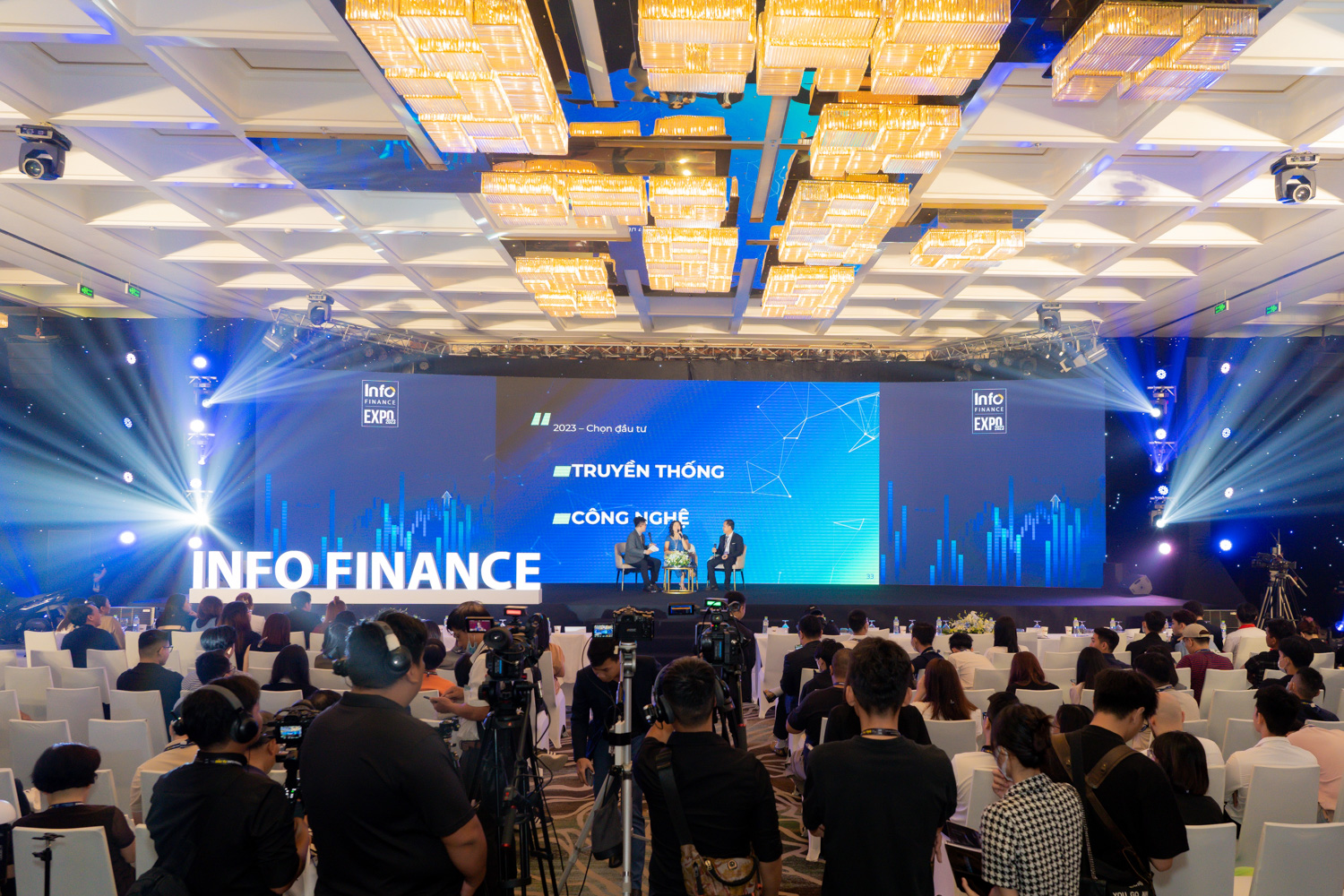









I. Organizing conferences and seminars for businesses
Organizing conferences and seminars is a familiar event format for sharing information and gathering feedback from customers and partners. Through these events, businesses have the opportunity to improve their products or services and seek opportunities to expand their business.
1.1. The concept of conferences and seminars
- What is a seminar?
A seminar is an event organized for discussion, exchange, and sharing of knowledge on a specific issue, often involving the participation of experts and individuals. The activities of a seminar focus on gathering opinions, clarifying causes, discussing, and summarizing the issues.
- What is a conference?
In contrast to a seminar, a conference is considered a larger-scale meeting. The purpose of a conference is to aggregate existing issues, including both strengths and weaknesses. After evaluating the weaknesses, the participants in this meeting will provide opinions and draw lessons to develop the company or organization in a better way.
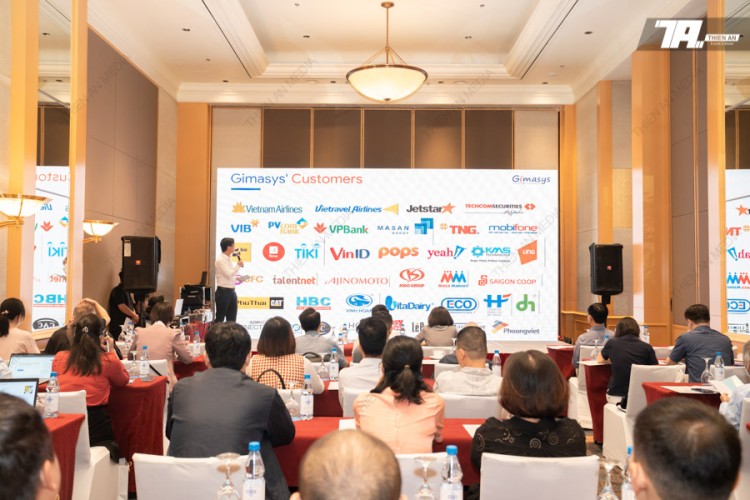
Project: Gimasys Workshop - Google Anthos & Multi-Cloud
1.2. The significant importance of organizing conferences and seminars
- Building brand reputation
Organizing conferences and seminars is seen as a marketing activity aimed at enhancing brand image and credibility in the eyes of partners and customers. The conference and seminar event is scripted and decorated based on the style and culture of the company or business, creating highlights and making a strong impression on partners and customers regarding the products being introduced.
- Building trust with partners and customers
If the purpose of organizing conferences and seminars is to share experiences and knowledge, it will attract the attention and interest of many people. Especially when the event is successful, the business will make a good impression on customers, thereby building stronger trust in the brand.
- Promoting products and services to potential customers
Organizing conferences and seminars is also an opportunity for businesses to promote their company's products and services. From introductory videos about the business to short films showcasing products and services, these elements create a lasting impression on the guests attending the event.
- Addressing persistent issues
Organizing conferences and seminars to address specialized and technical issues within the company, resolving practical problems that the business is facing.
II. Popular seminar formats
Experience-sharing seminar: Nowadays, organizing seminars is a popular choice for many businesses. In these seminars, experts or individuals with experience in a specific field share their experiences with others in the same field or those who have a common interest, such as partners or customers. Through these seminars, attendees have the opportunity to access new knowledge, exchange opinions, and learn from successful individuals in that particular field.
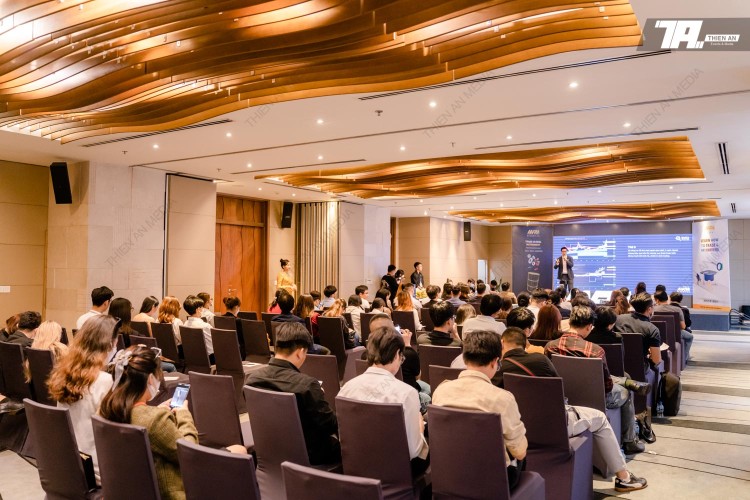
Project: MFM Securities Financial Investment Seminar
Workshop: It is an educational or training event format aimed at providing participants with knowledge and skills through two parts: information sharing and hands-on practice. Workshop-style seminars are typically organized on a small scale, ranging from 10 to 20 participants, to facilitate interaction and optimal learning between attendees and instructors.
New product introduction seminar: This is a widely used seminar format in the market today, where companies or organizations introduce new products to their customers or partners. Through the seminar, manufacturers or suppliers can present the features, advantages, and benefits of the new product to customers or partners. Additionally, it provides attendees with information related to product usage, maintenance, and post-sales support.
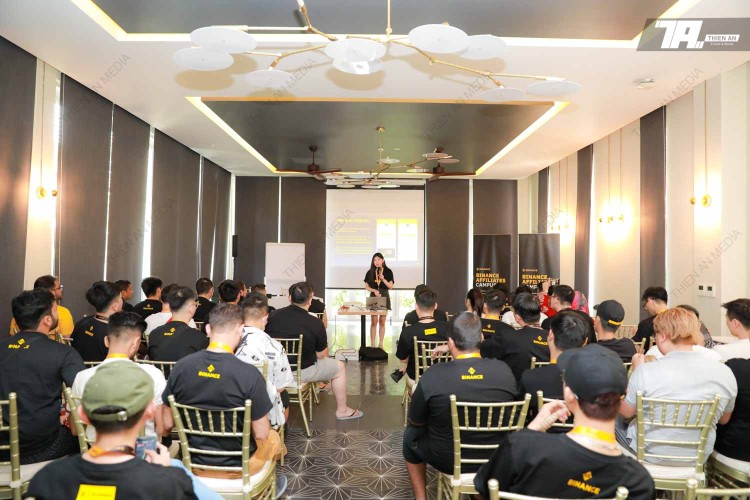
BINANCE AFFILIATES CAMPUS 2023
Industry-specific conference: It is a conference that focuses on issues related to a specific industry or profession, often involving the participation of experts and stakeholders in the same industry or field. In the conference event, attendees have the opportunity to access the latest documents, and analytical reports, and engage in discussions about trends, challenges, and opportunities in that field.
III. Popular conference formats
Year-end conference: This activity is organized by most businesses at the end of the year. The main content of the conference is to review the company's activities in the past year, evaluate successes and failures, draw lessons, and establish new strategies for the following year.
Investment and development collaboration conference: This conference format is very common among investors. Each conference will focus on a specific potential investment project, and the organizers will analyze issues related to that project to promote investment activities both domestically and internationally.
Customer conference: This conference format is widely adopted by many businesses to express gratitude to their customers and partners. The conference focuses on expressing appreciation and honoring customers and partners who have contributed to the company's success.

Organizing a seminar to express gratitude to customers
IV. Conference and seminar organizing process
Step 1: Determine the conference and seminar theme
Determining the theme is an important step that cannot be overlooked in the event-organizing process to ensure that the initial purpose of the business is fulfilled as intended. A clear and precise theme will help the business effectively convey the message and achieve the set objectives.
Example:
Technology: Themes in the technology field, such as artificial intelligence applications, the Internet of Things, Blockchain, etc., are often used in conferences and seminars organized by technology companies.
Step 2: Develop the conference and seminar organizing plan
- What is the ultimate goal that the event needs to achieve?
When organizing any program, businesses set expected goals for themselves. These goals may vary depending on specific circumstances. For example, in the case of organizing a workshop, the ultimate goal may be to increase sales, inspire participants in a particular field, etc.
- Define the content and script
Here is an example of the content for a conference and seminar event.
|
STT |
Time |
Work content |
Details |
Personnel in charge |
|
1 |
30’ |
Welcoming the guests. |
Guiding guests to parking areas. Assisting with taking photos for guests, and pre-event check-in. Verifying invitations and the number of attendees for the event. |
- Event organizing team - Security - Receptionist - Media |
|
2 |
20’ |
Commence the event. |
Opening with a cultural performance. The MC directs the invited guests to their seats and announces the purpose of the event. Introducing the key participants attending the event. |
- Singer - MC |
|
3 |
10’ |
The delegate delivers a speech. |
The MC invites the representative to deliver a speech and officially open the program. |
- Business representative. |
|
4 |
10’ |
Presentation of conference content. |
Screening a video (which could be a product launch video, introduction to a charity program, etc.) according to the content and purpose of the conference. |
- Technician. |
|
5 |
2’ |
Announcement of banquet commencement. |
Opening ceremony |
- MC - Business representative |
|
6 |
25’ |
Interactive games. |
The MC introduces and instructs the guests to participate in the mini-game. After it concludes, a company representative will take the stage to present the prize to the winner. |
- MC - PG - Business representative |
|
7 |
15’ |
Performing arts show. |
Performing arts act: It can be a song performance, instrumental music, contemporary dance, etc. |
- Dance group, Musician, or instrumentalist |
|
8 |
15’ |
Express gratitude and present appreciation gifts to guests. |
MC expressed gratitude on behalf of the company to the guests. Promotional girls approach each table to deliver gifts or plan gift distribution for guests as they leave the event. |
- MC - Receptionist or Front Desk Officer - Business Representative or Company Representative |
|
9 |
10’ |
Conclude the program. |
Announcing the conclusion of the event and expressing gratitude to all attending guests. Guiding guests to proceed to the gift reception table or directing them towards the exit route. |
- MC - Event Security or Security Personnel - Event Organizing Team or Event Management Team |
- Selecting a suitable venue and timing for the event
Determining the venue for conferences and seminars includes:
Identifying the venue for conferences or seminars is one of the crucial factors to ensure the success of the event. To choose a suitable venue, you should consider the following factors:
Capacity: The venue must have sufficient capacity to accommodate the number of attendees. You need to carefully calculate the number of guests to avoid issues such as overcrowding or a feeling of unprofessionalism due to excessive space.
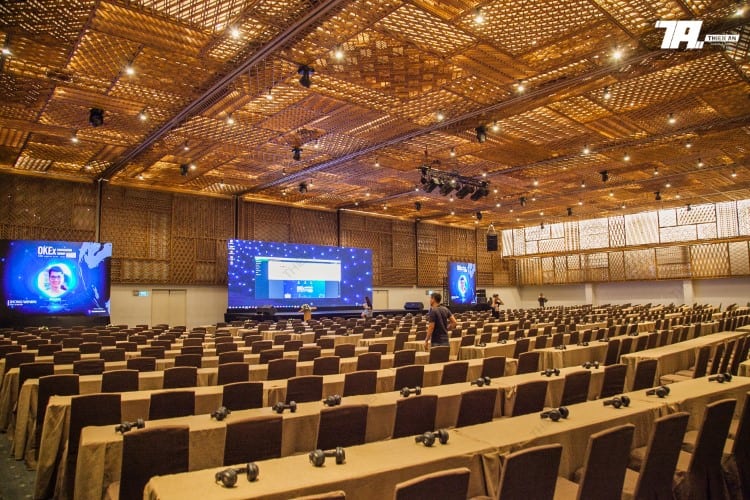
- Choosing a conference venue
Location: The location of the venue should be convenient for attendees to access. If the event is held in a city, it is advisable to choose a venue that is situated near central areas or easily accessible locations.
Facilities: The venue should provide necessary facilities such as private meeting rooms, audiovisual equipment, sound and lighting systems, and strong internet connectivity to ensure smooth event organization.
Budget: The venue should align with the allocated budget for the event. It is advisable to consider the pricing of different venues to make an appropriate choice.
- Determining the event schedule
Convenient timing: It is important to select a time frame that is convenient for the target audience, avoiding conflicts with holidays, vacations, or other significant events.
Event duration: The event duration should be carefully considered to align with the content and number of attendees. If the event is too long, participants may feel fatigued and lose focus.
Weather conditions: If the conference or seminar is held outdoors, regular monitoring of weather forecasts is necessary, along with contingency plans to avoid any unforeseen circumstances.
Budget considerations: The event timing is also related to budget implications. Organizing during peak seasons may result in increased costs for venue, equipment, and services.
- Creating a guest list and determining the number of attendees
Determining the appropriate number of attendees is essential to align with the event's objectives and ensure that the venue is neither overcrowded nor sparsely populated. Careful consideration should be given to strike a balance that provides an engaging and comfortable experience for all participants.
- Calculating the event budget and creating an expenditure plan
To calculate the event budget, it is necessary to determine the essential expenses involved in organizing the event, including:
Venue-related expenses: This includes costs for venue rental, decorations, audiovisual equipment, and event support.
Guest-related expenses: This covers expenses for invitations, gifts, and ticket fees (if applicable).
Advertising and media expenses: These encompass costs for printing invitations, event materials, poster design, and banners.
Content expenses: This includes fees for guest speakers, MCs, bands, singers, artists, and artistic program costs.
Food and beverage expenses: This covers catering services, beverages, and serving staff.
Miscellaneous expenses: These are additional costs such as transportation for guests, accommodation fees (if applicable), and fees for event organizing teams.
After calculating the necessary expenses, you can create a detailed expenditure plan for each item. This helps ensure that the event runs smoothly and achieves its objectives within the allocated budget.
Choosing a professional event management company to support the organization of seminars and conferences ensures the smooth execution of the event.
- Renting event management company offers the following benefits to businesses
- Professional support in planning, execution, and event management.
- Time and effort-saving, as well as cost optimization in event organization.
- Assurance of event quality and effectiveness.
- Leveraging the experience and relationships of the event management company to minimize risks and enhance the success of the seminar or conference.
Step 3: Prepare for the conference or seminar
If a business wants to proactively organize a seminar or conference, the preparation work will take a considerable amount of time to arrange personnel and carefully select the most suitable program segments.
However, if the business trusts and delegates the event organization task to a reputable agency, this work will be carried out efficiently and time-saving.
Step 4: Execute the program
If planning a seminar or conference is challenging, implementing the event can be even more daunting. However, with thorough preparation, the execution becomes less stressful and follows the plan.
One piece of advice when organizing a seminar or conference is to prepare contingency scenarios for potential situations that may arise during the program. This ensures that everything runs smoothly.
Step 5: After the conference program ends
After the program concludes, to leave a positive impression on the attendees, you can prepare souvenirs or shopping vouchers. This not only demonstrates the company's dedication to its customers but also serves as an expression of gratitude for their participation in the event.
Next, it is important to evaluate the outcomes of the program, taking note of the achievements and areas for improvement. This allows for reflection, learning from the experience, and making enhancements for future seminars and conferences.
V. Conference organization services - Thien An Media
Thien An Media is a reputable, full-service conference and event organization provider in Ho Chi Minh City. We ensure that all tasks related to the preparation and execution of the program are completed professionally and efficiently, allowing businesses to save time and focus on their core activities.
For every program, Thien An Media is dedicated and treats it as their child, whether big or small, whether the budget is large or small. With extensive experience in this field, we will bring customers new and suitable ideas for their goals, helping to create a special impression with the audience and the media.
Other Service
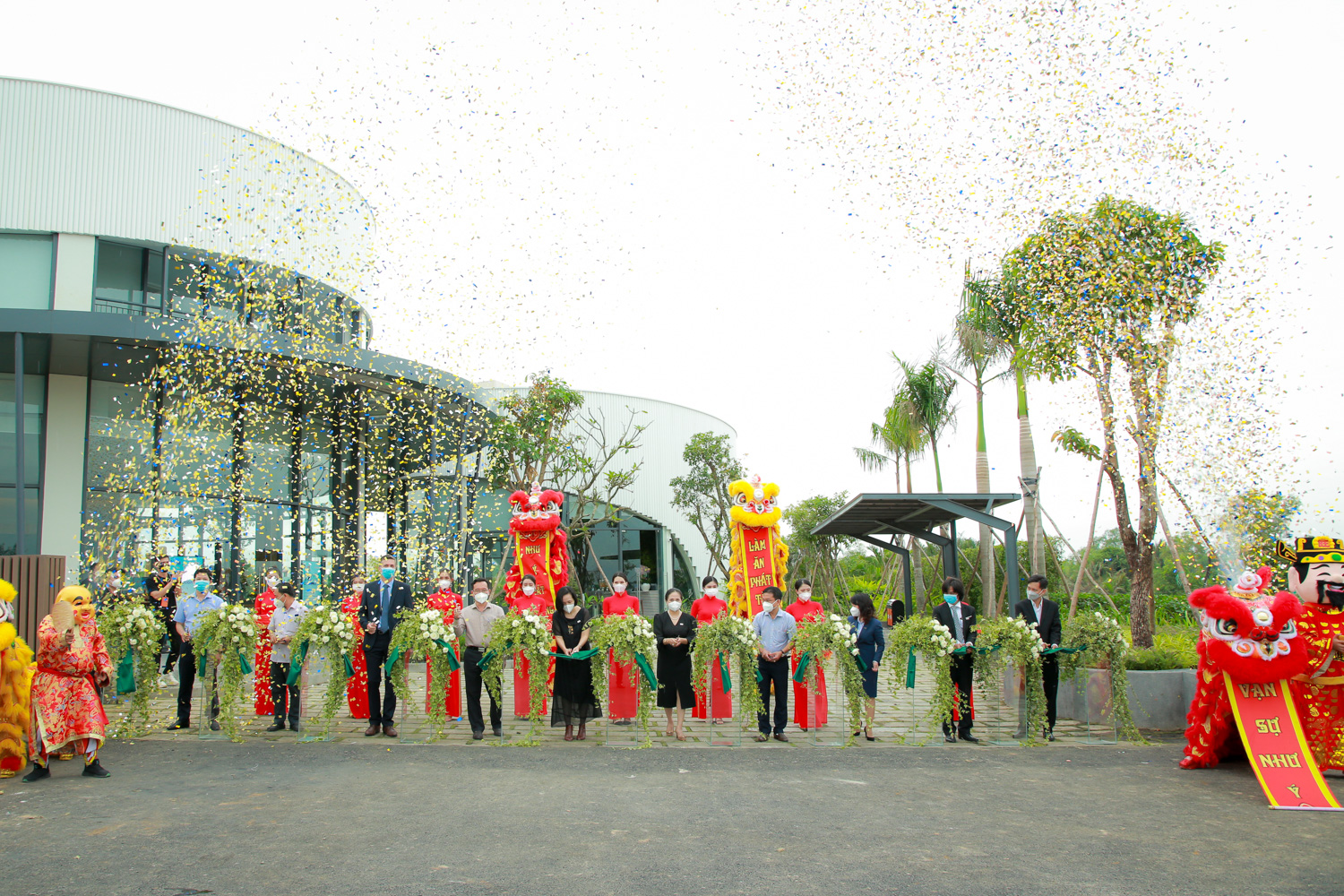
Grand Opening
The grand opening is not only as an introduction of a company, store, showroom, etc, but also a means to jumpstart growth, aid in positioning brands in the market, and a crucial opportunity to showcase the company's image to potential partners and customers to promote business.

Year End Party - The New Year
The end of the year presents a great opportunity for companies to host a party to celebrate their achievements and strengthen the bond among employees. Thien An Media offers comprehensive year end party planning services for your company, which will save you time and energy.
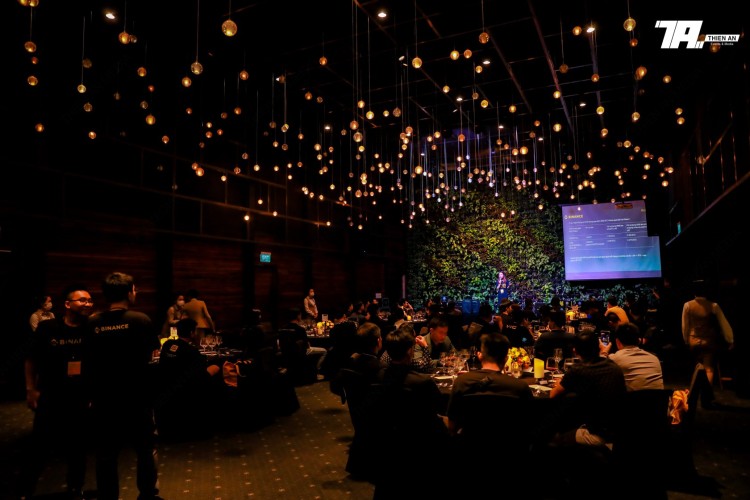
Gala Dinner
A Gala Dinner is an important event that requires meticulous preparation. To help you save time and costs, this article introduces a full-service Gala Dinner organizing service with fast and impressive quotes. From there, you can confidently carry out your special event easily an...

Conferences And Seminars
For businesses, organizing conferences and seminars is seen as a way to improve products/services, as well as to seek opportunities for expanding their business scale.

Customer Appreciation Conference
If you want to organize a customer appreciation event with the best quality partners, come to Thien An Media. We are a trusted company in this field, with a team of professionals who will advise you on every aspect of your customer appreciation event.
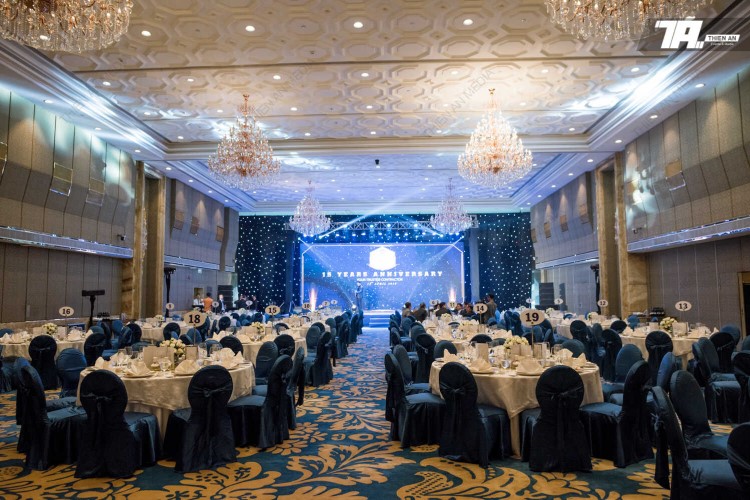
Corporate Anniversary
The corporate anniversary is an extremely special event that commemorates a milestone in the company's development. It is an opportunity for the company to express gratitude to its customers and partners while acknowledging the contributions and dedication of all employees.
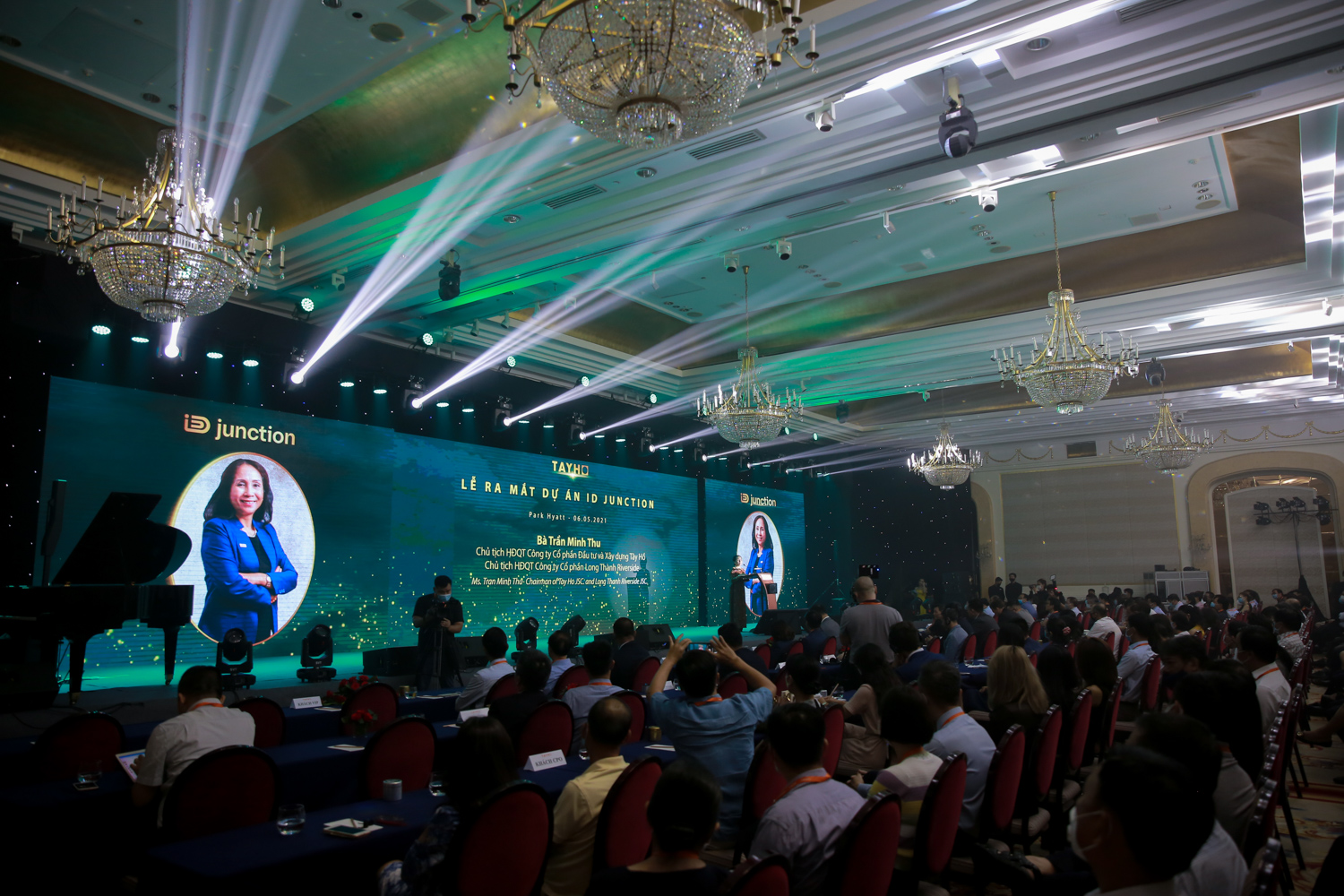
Product Launch Event
Are you planning to organize a product launch or the introduction of a new project? Why hesitate when you can contact Thiên An Media to experience professional event services with unique ideas and scripts?
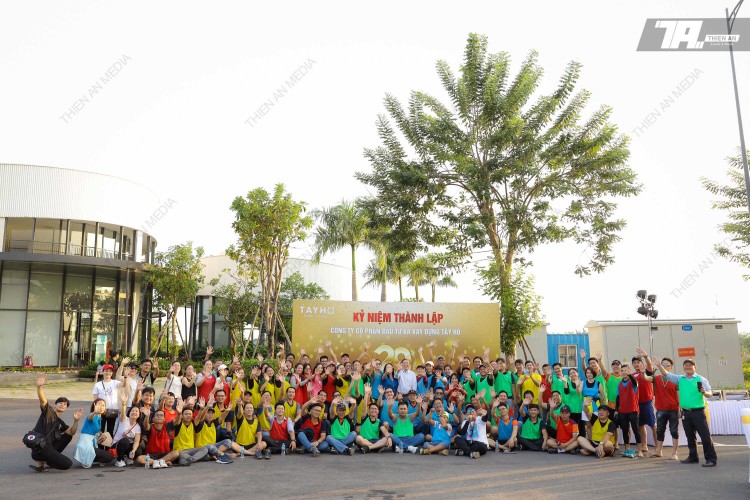
Sport Day - Team Building
Thien An Media stands as one of the premier and esteemed team-building companies in Ho Chi Minh City. With an experienced team of staff, we can customize and design team-building programs to meet the requirements and desires of each business.

Event Online - Virtual Event
Event online is a program that takes place on the internet, and participants interact and exchange with each other through an online environment.

Mid-Autumn Festival
Thien An Media is the leading company in organizing Mid-autumn Festival events in Ho Chi Minh City and surrounding provinces. With extensive experience in organizing numerous projects related to the Mid-autumn Festival, we guarantee to bring children an exciting and meaningful pr...
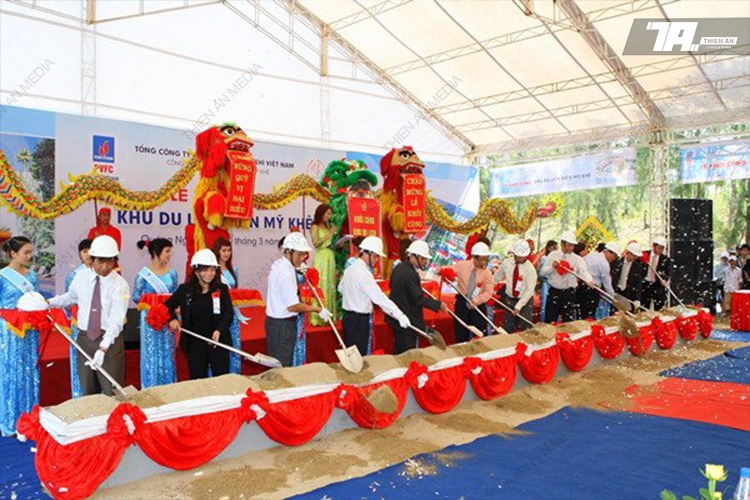
Groundbreaking Ceremony
Breaking new ground with our extraordinary Groundbreaking Ceremony services. Witness the birth of something extraordinary! Join us now.





